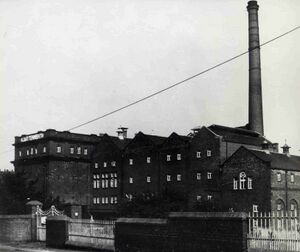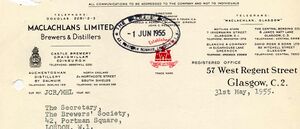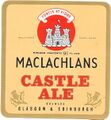Maclachlans Ltd
Maclachlans Ltd, Castle Brewery, Duddingston Road, Edinburgh, Lothian
Originally wine and spirit merchants. The Castle Brewery, Maryhill, Glasgow was acquired in 1889 and the Castle Brewery, Edinburgh opened March 1900. Registered 1907 as G and J Maclachlan Ltd and as Maclachlans Ltd. in 1923.
Acquired by Tennent Ltd in 1960 and brewing ceased in 1966. Brewery demolished 1975.
Maclachlans Ltd, Castle Brewery, Wyndford Street, Maryhill, Glasgow, Strathclyde
Commenced 1891. Closed by 1907, and became a soft-drink factory.
MACLACHLAN's LTD, Castle Brewery, Craigmillar, Edinburgh
by Charlie McMaster, Archivist, Scottish Brewing Archive
(Reproduced from the Brewery History Society Journal no. 55, February 1989)
The brothers George and John Maclachlan came to Glasgow from their home at Strathallan in Perthshire in the 1870s, the eldest brother George Maclachlan arriving in 1871 with his younger brother John following him in 1876.
Both brothers entered the wine and spirit trade independently of each other, and by 1886 George Maclachlan had prospered sufficiently to acquire the long established firm of J & J McCulloch, wine and spirit merchants and whisky blenders of Argyle Street, Glasgow, which had been in business since 1820. McCulloch's "lona" and "Castle" brands of whisky were well renowned, and the rights to these brand names and the trade marks of this company (a castle) came along with the purchase, as did McCulloch's motto "Fortis et Fidus".
In 1889 the two brothers entered into a partnership to add a brewing interest to their successful wine and spirit business, by purchasing premises at Wyndford Street, Maryhill, Glasgow, and converting these into a brewery, which became known as the Castle Brewery, the siting of which necessitated the sinking of an artesian well some three hundred feet deep.
Meanwhile, the spirit side of the business continued to expand, and an Irish dimension was added in 1896 with the acquisition of James Lipsey & Co of Belfast, whose Irish Whiskey was much in demand amongst the large Irish population in the West of Scotland.
By this time the Maryhill Brewery, although producing some six hundred barrels per week was unable to keep pace with demand, and, lacking room for expansion, the decision was taken at the turn of the century to erect a substantial new brewery at Craigmillar near Edinburgh, which had the advantages of fine brewing water and good rail connections, and where a number of breweries has already been established. This new brewery, also known as the Castle Brewery, was opened in 1901, and was the last of the seven breweries in Craigmillar and Duddingston to be completed. As built, it had a capacity of two thousand barrels per week. The Maryhill Brewery was kept open for a few more years, but closed by 1907, subsequently passing into the hands of T Thompson & Co, wine and spirit merchants, and in 1910 to Finlay, McDermid & Co, aerated-water manufacturers and bottlers.
By the early 20th century the Maclachlan brothers, and George Maclachlan in particular, were very wealthy men. The latter was well known for his sporting proclivities, being co-founder along with Sir John Astley of Hamilton Park Racecourse. He was also well known as a philanthropist, being at various times chairman of the Glasgow Perthshire Charitable Society and the Scottish Licensed Trade Benevolent Institution. George Maclachlan built himself a large house with extensive at Ibroxhill, complete with a herd of Highland cattle: today these grounds form part of Bellahouston Park.
In 1902, as befitted the company's image, a large and imposing seven storey castellated office block was erected in the centre of Glasgow, on the corner of West Regent Street and Renfield Street. In the basement of this building, which became known as Castle Chambers, there was extensive cellarage space and a bottling plant, and hence the building was used as a storage and distribution centre as well as for offices. In 1903, to safeguard supplies of malt whisky for blending purposes, the Auchentoshan Lowland Malt Whisky Distillery near Duntocher, Dunbartonshire, was acquired from Alexander Ferguson & Co, its previous owners.
That same year, in 1903, George Maclachlan embarked on an extensive tour of South Africa, to promote the firm's interest there, but on his return was met with the news that his brother John Maclachlan had died suddenly. Nevertheless, the firm continued to expand, building up a sizeable export trade to South Africa and India in particular, whilst at home London offices were opened at 41 Eastcheap, where George Maclachlan's son, Norman, was placed in charge. In fact, the company gained a prestigious contract to supply their "Five Castle" whisky to the House of Lords.
The firm became a private limited company in 1907, under the title of G & J Maclachlan, and this title was maintained until 1923 when the firm's title was changed to Maclachlans Ltd.
The Second World War struck Maclachlan's a severe blow when the Auchentoshan Distillery was badly damaged by bombing in 1941, and it was well after the end of the war before it could be rebuilt. About this time also a new bottling plant was installed at recently acquired premises at Invernairn Street, Parkhead, Glasgow. This had formerly been the Home Brewery of Geo Dalrymple & Co, and had latterly been in the hands of the brewing firm of Gordon & Blair Ltd. In June 1947 Maclachlans Ltd was turned into a public company with an authorised capital of £300,000, but the post-war years were difficult ones for the brewery business, and Maclachlans suffered the same as everybody else. The geographical separation of the brewing and bottling sides of the operation caused problems when transport and distribution costs rose in the 1950s, for there was never a bottling line at the Castle Brewery, and much of the trade was in the West. The North East of England trade had fallen away totally by this time. A canning line was installed in the late 1950s, but in 1960 Maclachlans Ltd sold out to their Glasgow rivals J & R Tennent Ltd.
Maclachlan's products had a good reputation in the West of Scotland, and even after the takeover many publicans in that area insisted on Maclachlan's beers in preference to the Tennent's beers which were now made available, and a kegging plant was installed by Tennents. The Castle Brewery was kept open while Tennent's Wellpark Brewery was reconstructed in 1965-1966, but on 1st January 1966, Tennents merged with United Caledonian Breweries Ltd to form Tennent Caledonian Breweries.
It was quickly decided to concentrate the new consortium's East of Scotland brewing activities on the former Jeffrey's Heriot Brewery at Roseburn in Edinburgh, and accordingly brewing ceased at the Castle Brewery early in 1966, the official reason being that the water supply was polluted, although a subsequent independent analysis tended to refute this. The maltings and the cooperage continued in operation for a little while, but the whole brewery was closed by the late 1960s, and lay empty for a few years before being demolished in about 1975.
|


